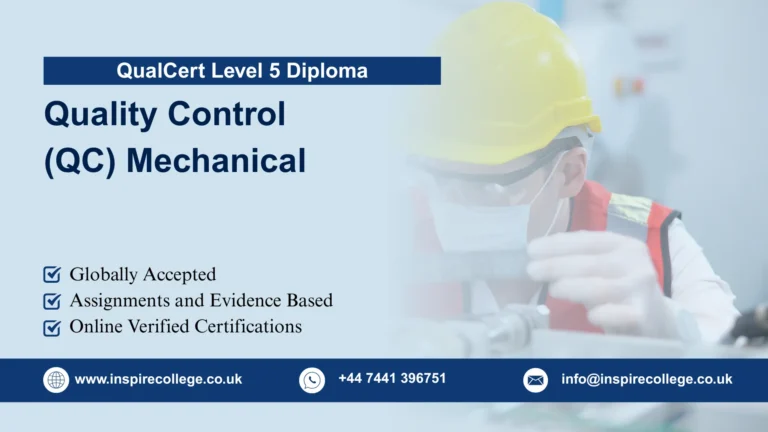
QualCert Level 2 Diploma in Civil Technology
The field of civil technology is at the heart of modern infrastructure development, playing a critical role in the design, construction, and maintenance of essential public and private projects. The QualCert Level 2 Diploma in Civil Technology is designed to build on foundational knowledge and provide learners with advanced practical skills required for a successful career in civil engineering and construction industries. QualCert Level 2 Diploma in Civil Technology equips learners with both theoretical understanding and hands-on experience, preparing them to meet the technical demands of the modern workforce.
The purpose of QualCert Level 2 Diploma in Civil Technology is to deepen learners’ expertise in civil technology by focusing on construction techniques, surveying, technical drawing, material science, and health and safety practices. Participants will gain the ability to interpret complex engineering drawings, assess and select construction materials, perform precise field measurements, and apply engineering principles to real-world projects. Emphasis is placed on integrating sustainable practices, understanding environmental impacts, and adhering to industry standards to ensure quality and safety on construction sites.
By completing QualCert Level 2 Diploma in Civil Technology, learners will acquire valuable skills in project planning, site management, and technical problem-solving, enabling them to contribute effectively to civil engineering and construction projects. Graduates will be prepared for entry-level technical roles, including engineering technicians, surveying assistants, and CAD operators, while also laying the groundwork for further progression to higher-level qualifications in civil engineering and construction management.
To ensure learners are well-prepared and able to fully engage with the curriculum, the following entry requirements have been established for the Level 2 Diploma in Civil Technology. These criteria are designed to support academic success and practical skill development throughout the course:
- Minimum Age Requirement: Applicants must be at least 18 years old at the time of enrolment. This ensures that learners possess the maturity and commitment required to succeed in a structured, technical learning environment.
- Educational Background: Learners should have completed a high school diploma or an equivalent qualification, such as a General Education Development (GED) certificate. Some programs may specify the completion of secondary education to ensure participants have foundational academic skills, including numeracy, literacy, and problem-solving abilities, which are essential for understanding complex civil technology concepts.
- Language Proficiency: Proficiency in the language of instruction, typically English, is essential. Learners must be able to comprehend technical materials, actively participate in classroom or online discussions, complete written assignments, and communicate effectively with peers and instructors. Strong language skills facilitate engagement with theoretical and practical components of the course.
- Recommended Prior Experience: While not mandatory, learners with prior exposure to civil technology, construction, or related fields may benefit from enhanced contextual understanding. Previous work experience or practical training can provide a valuable foundation for grasping quality control principles, project planning, and site management concepts.
- Foundational Training: Although optional, it is highly recommended that learners have completed a Level 1 Diploma in Civil Technology or an equivalent foundational program. This prior training helps ensure familiarity with basic principles, tools, and terminology used in civil technology, enabling learners to progress confidently to more advanced concepts and practical applications.
By meeting these entry requirements, learners are positioned to maximize the benefits of the Level 2 Diploma in Civil Technology, equipping them with the skills, knowledge, and practical experience necessary for successful academic and professional development in the civil engineering and construction sectors.
Mandatory Units
The QualCert Level 2 Diploma in Civil Technology is a 42-credit qualification with a Total Qualification Time (TQT) of 210 hours, including 150 Guided Learning Hours (GLH). This course is thoughtfully designed to provide targeted and efficient skill development in the field of Civil, offering learners a solid foundation to build their expertise.
Mandatory Units
Upon successful completion of the Level 2 Diploma in Civil Technology, learners will have developed a comprehensive understanding of civil engineering principles, practical construction techniques, and advanced technical skills. The course equips students to apply theoretical knowledge to real-world projects, preparing them for entry-level roles in civil engineering, construction, and infrastructure development.
1. Structural Mechanics
Learners will:
- Understand the core principles of structural mechanics, including the behavior of forces, stress, and strain on materials.
- Analyze how different materials respond to varying load conditions such as tension, compression, and shear.
- Apply concepts of equilibrium to solve engineering problems involving beams, trusses, and frame structures.
- Evaluate the stability, strength, and performance of basic structural systems, ensuring safe and reliable design solutions.
2. Advanced Surveying
Learners will:
- Master advanced surveying techniques, including the use of modern electronic instruments such as total stations, GPS systems, and digital measuring tools.
- Perform precise measurements required for large-scale and complex construction projects.
- Interpret and create detailed topographic maps, survey plans, and comprehensive reports.
- Apply advanced surveying methods to address real-world engineering and infrastructure challenges effectively.
3. Building Construction Methods
Learners will:
- Explore a variety of construction techniques used across residential, commercial, and industrial building projects.
- Understand the processes involved in structural framing, roofing, flooring, and finishing works.
- Evaluate the selection of appropriate construction methods based on project requirements, cost considerations, and site constraints.
- Demonstrate knowledge of modern construction technologies, including sustainable practices and innovative building solutions.
4. Soil and Foundation Basics
Learners will:
- Understand the properties, classification, and behavior of different soil types in relation to construction.
- Analyze how soil responds under various load conditions and environmental factors.
- Learn fundamental principles of foundation design, including shallow and deep foundation systems.
- Assess site conditions to recommend suitable foundation solutions for diverse types of structures.
5. Construction Project Management
Learners will:
- Understand the principles of construction planning, project scheduling, and effective management techniques.
- Develop skills in resource allocation, cost estimation, budgeting, and financial planning for projects.
- Monitor project progress to ensure adherence to timelines, quality standards, and safety requirements.
- Apply risk management strategies to anticipate and mitigate potential challenges in construction projects.
6. Applied Mathematics for Civil Technology
Learners will:
- Utilize advanced mathematical concepts to solve complex civil engineering and construction problems.
- Apply trigonometry, algebra, and introductory calculus to perform calculations in design, structural analysis, and surveying.
- Calculate material quantities, dimensions, and project specifications accurately for engineering applications.
- Develop problem-solving skills through mathematical modeling and analysis of real-world civil technology scenarios.
The Level 2 Diploma in Civil Technology is designed for individuals seeking to develop practical skills and technical knowledge in civil engineering, construction, and infrastructure development. This course is suitable for learners at various stages of their education or career and provides a strong foundation for both employment and further study.
This course is particularly suitable for:
- High School Graduates: Recent graduates who wish to start a career in civil technology or construction. The course provides essential knowledge and hands-on skills for entry-level roles.
- Career Changers: Individuals looking to transition into the civil engineering or construction industry, gaining a comprehensive introduction to the field and practical technical skills.
- Construction Enthusiasts: Learners with a strong interest in building projects, infrastructure development, or civil technology, even without prior formal education or industry experience.
- Aspiring Technicians: Those aiming to become construction technicians, surveying assistants, CAD drafters, or support staff in civil engineering projects.
- International Students: Learners from abroad seeking foundational knowledge of civil technology and construction practices relevant to local or international contexts.
- Adult Learners: Adults looking to acquire new skills, expand their knowledge, or re-skill for career opportunities in construction and civil engineering.
- Career Advancers: Individuals currently employed in construction or related industries who want to enhance their technical expertise and progress into more specialized or technical roles.
- Preparation for Further Education: Learners planning to pursue higher education, such as Level 3 diplomas, foundation degrees, or HNDs in civil engineering or related fields, will benefit from the strong foundational knowledge provided by this course.
This diploma is ideal for anyone seeking to combine theoretical knowledge with practical application, preparing learners for successful careers in civil engineering, construction, and related technical industries.and certification to help you succeed.
Register Now
FAQs for QualCert Level 2 Diploma in Civil Technology






